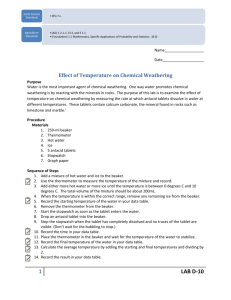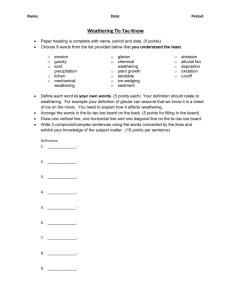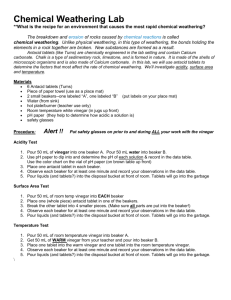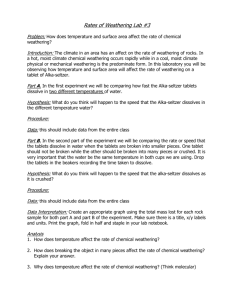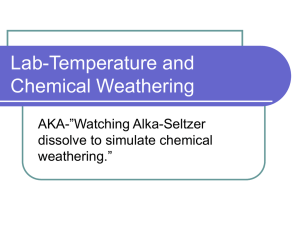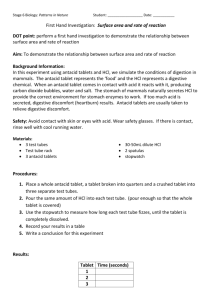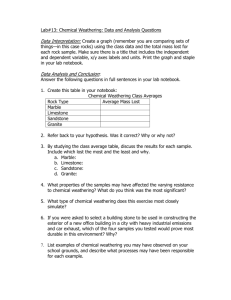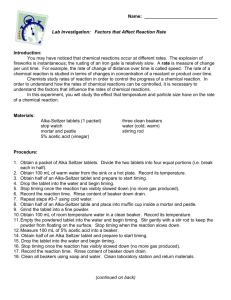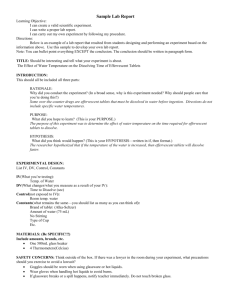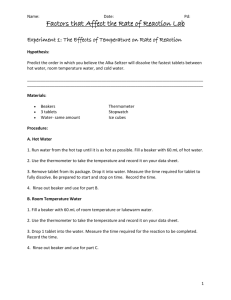Chemical Weathering Experiment Worksheet
advertisement
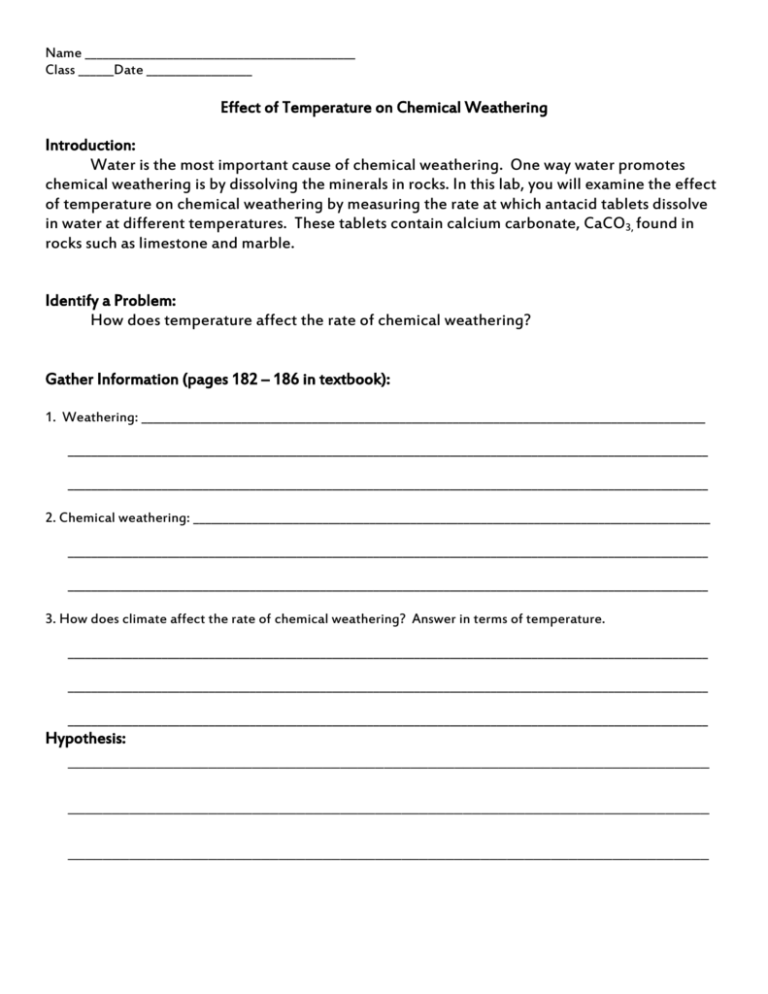
Name ______________________________________________ Class ______Date __________________ Effect of Temperature on Chemical Weathering Introduction: Water is the most important cause of chemical weathering. One way water promotes chemical weathering is by dissolving the minerals in rocks. In this lab, you will examine the effect of temperature on chemical weathering by measuring the rate at which antacid tablets dissolve in water at different temperatures. These tablets contain calcium carbonate, CaCO3, found in rocks such as limestone and marble. Identify a Problem: How does temperature affect the rate of chemical weathering? Gather Information (pages 182 – 186 in textbook): 1. Weathering: ________________________________________________________________________________________________ _____________________________________________________________________________________________________________ _____________________________________________________________________________________________________________ 2. Chemical weathering: ________________________________________________________________________________________ _____________________________________________________________________________________________________________ _____________________________________________________________________________________________________________ 3. How does climate affect the rate of chemical weathering? Answer in terms of temperature. _____________________________________________________________________________________________________________ _____________________________________________________________________________________________________________ _____________________________________________________________________________________________________________ Hypothesis: _________________________________________________________________________ _________________________________________________________________________ _________________________________________________________________________ Materials: beaker thermometer water: room temperature and hot (40 – 50o C) ice 5 antacid tablets stopwatch/timer or clock with second hand Procedure: 1. Add a mixture of water and ice to the beaker. Use the thermometer to measure the temperature of the mixture. Add either more water or more ice until the temperature is between 0oC and 10oC. The total volume of the mixture should be about 200 mL. 2. When the temperature is within the correct range, remove any remaining ice from the beaker. Record the starting temperature of the water in the Data Table. Remove the thermometer from the beaker. 3. Drop one antacid tablet into the beaker. Start timing as soon as the tablet enters the water. Stop timing when the tablet is completely dissolved and no traces of tablet are visible. Don’t wait for the bubbling to stop. Record time in the data table. 4. Pour out the water from the beaker and rinse out any residue left behind by the dissolved tablet. 5. Repeat Steps 2 – 6 four more times, once at each of the following temperature ranges: 1020oC, 20-30oC, 30-40oC, and 40-50oC. Use the hot water for the warmer temperatures; adjust the relative amounts of hot water and ice to produce the correct temperature ranges. The total volume of water and ice mixture should always be about 200 mL. 6. Obtain information for Trials 2 and 3 from a different lab group. Calculate average dissolving time and record on your data table. 7. Lab Clean Up: Rinse beakers and thermometers and return. Put away timers. Throw away trash. Wipe table down. Data Table: Effect of Temperature on Chemical Weathering Temperature Range Starting Temperature (oC) Dissolving Time (seconds) Trial 1 Dissolving Time (seconds) Trial 2 Dissolving Time (seconds) Trial 3 AVERAGE DISSOLVING TIME (SECONDS) 0 – 10oC 10 – 20oC 20 – 30oC 30 – 40oC 40 – 50oC Analyze and Conclude: (Answer in complete and detailed sentences!) 1. At which temperature did the antacid tablet dissolve most rapidly? ____________________________________________________________________________________________________________ 2. At which temperature did the antacid tablet dissolve most slowly? ___________________________________________________________________________________________________________ 3. What is the relationship (connection) between temperature and the rate at which antacid tablets dissolve in water? ___________________________________________________________________________________________________________ ___________________________________________________________________________________________________________ ___________________________________________________________________________________________________________ 4. Was your hypothesis correct or incorrect? __________________________________________________________________________________________________________ 5. How could you change or improve this experiment to make your findings more accurate? __________________________________________________________________________________________________________ __________________________________________________________________________________________________________ __________________________________________________________________________________________________________ 6. What do you think your results would have been if you had ground each tablet into a fine powder before dropping it into the water? Please read about surface area on page 184. Explain your answer! _________________________________________________________________________________________________________ _________________________________________________________________________________________________________ _________________________________________________________________________________________________________ __________________________________________________________________________________________________________ __________________________________________________________________________________________________________ __________________________________________________________________________________________________________ 7. Would a limestone building weather more rapidly in Homer, Alaska or in Honolulu, Hawaii? (Both cities receive about the same amount of precipitation in an average year). Explain your reasoning and tell how the lab results support your answer. _________________________________________________________________________________________________________ _________________________________________________________________________________________________________ _________________________________________________________________________________________________________ _________________________________________________________________________________________________________ _________________________________________________________________________________________ __________________________________________________________________________________________ Summary: (Write a paragraph describing what you and your partners did in this lab investigation. Describe in words the results you obtained, including the actual numbers.) ______________________________________________________________________________________________ ______________________________________________________________________________________________ ______________________________________________________________________________________________ ______________________________________________________________________________________________ ______________________________________________________________________________________________ ______________________________________________________________________________________________ ______________________________________________________________________________________________ ______________________________________________________________________________________________ ______________________________________________________________________________________________ Conclusion: Paragraph 1:Write a well written paragraph explaining how the data does or does not support the hypothesis. Be sure to include your data to support your conclusion. Also, why and how is this experiment relevant to the concepts being taught in class? Paragraph 2: Write a paragraph describing an errors made or limitations to the lab. Include any suggestions you have to improve the lab for future students. (3-5 sentences per paragraph) ______________________________________________________________________________________________ ______________________________________________________________________________________________ ______________________________________________________________________________________________ ______________________________________________________________________________________________ ______________________________________________________________________________________________ ______________________________________________________________________________________________ ______________________________________________________________________________________________ ______________________________________________________________________________________________ ______________________________________________________________________________________________ ______________________________________________________________________________________________ ______________________________________________________________________________________________ ______________________________________________________________________________________________
